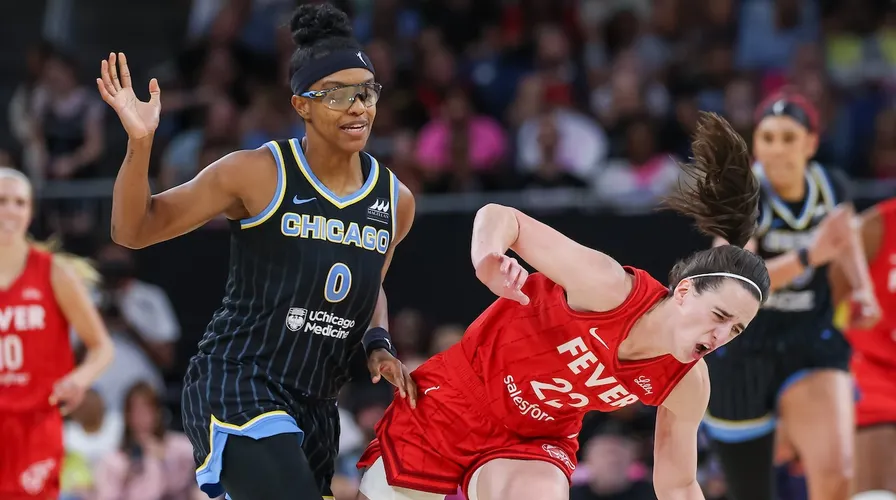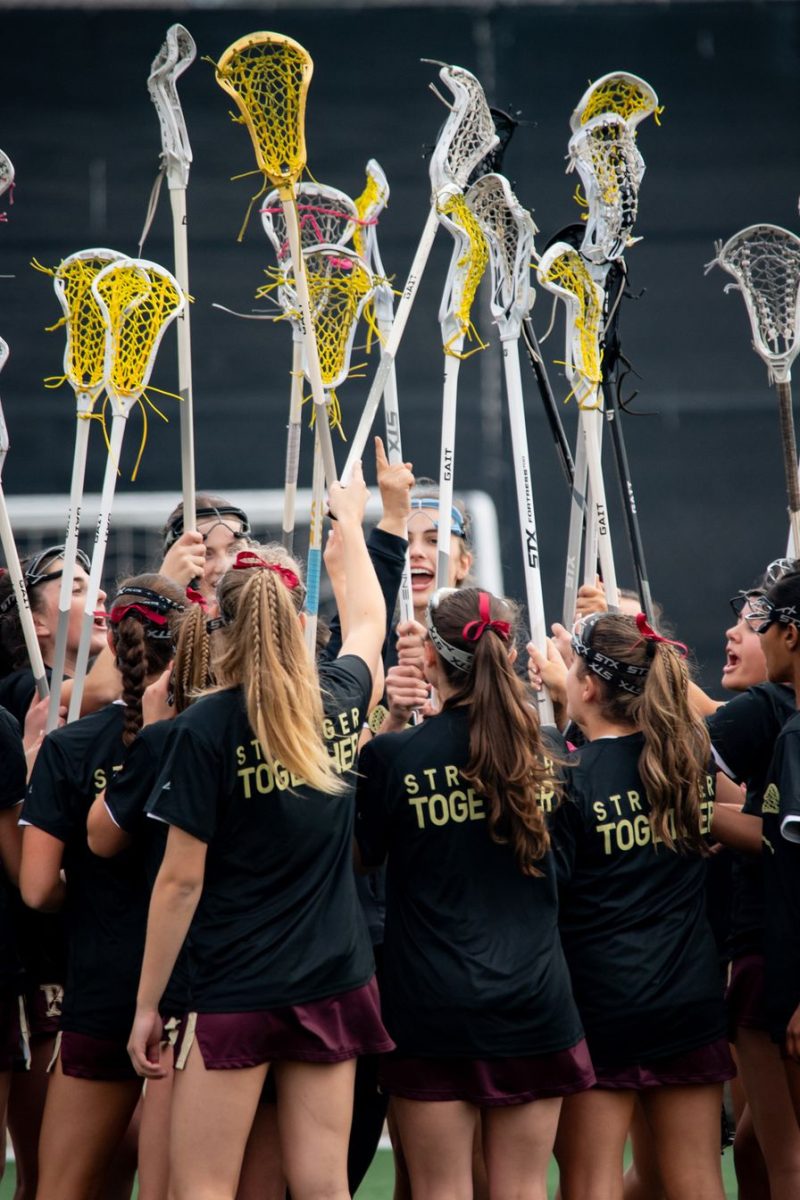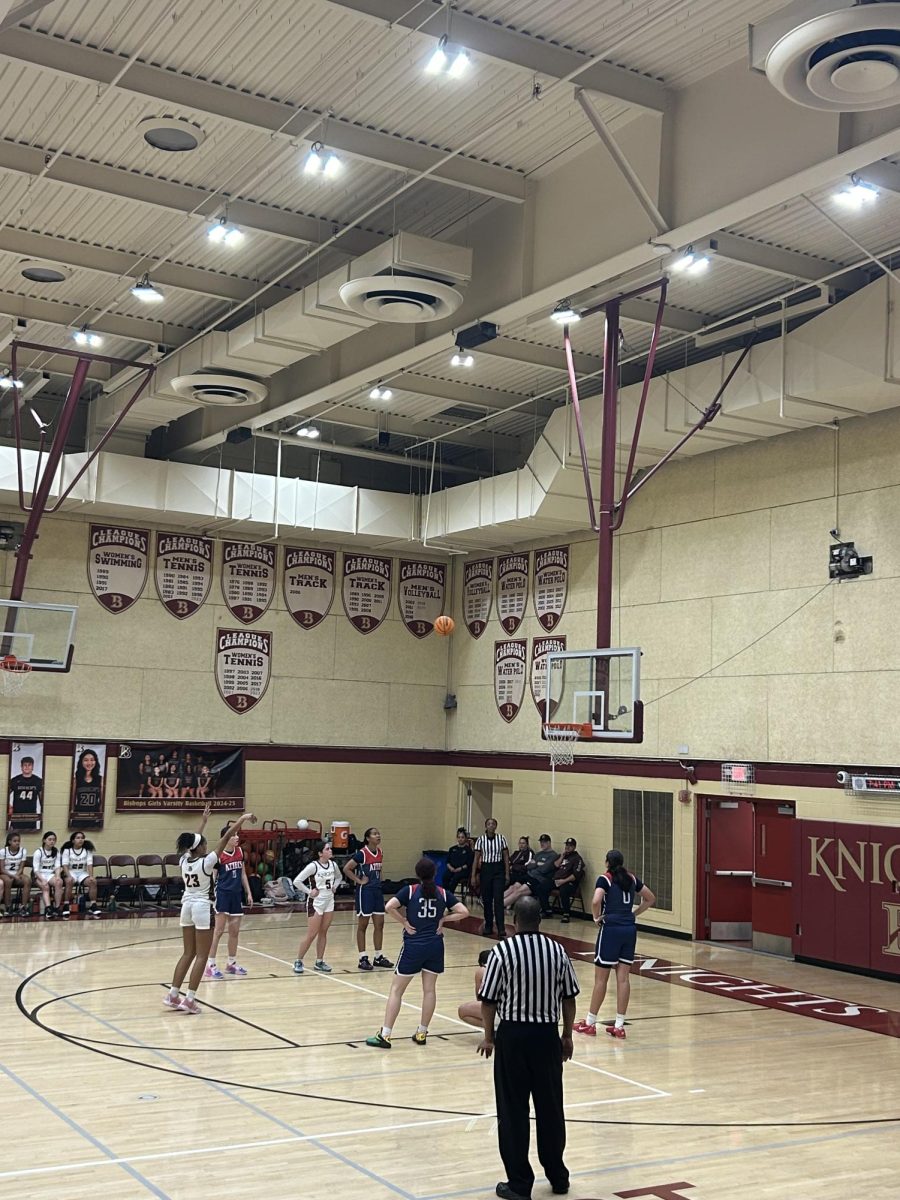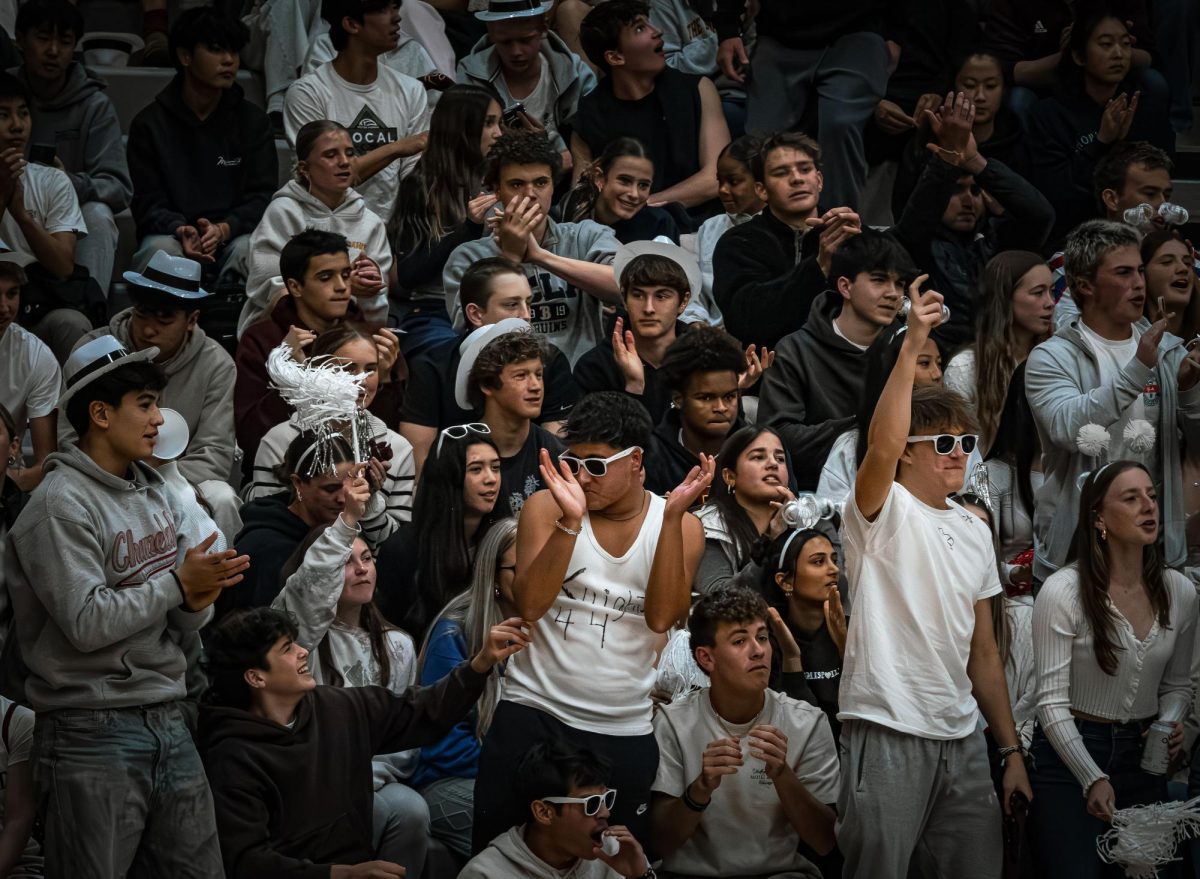It’s the last few minutes of the third quarter in a heated match between the Chicago Sky and Indiana Fever. Fans hold their breaths as the Fever takes out the ball. Suddenly, Fever star rookie Caitlin Clark is sent tumbling to the ground by Sky guard Chennedy Carter and called a “B*tch.” Some called it a classic rookie welcome. Others called it an unneeded cheap-shot. Officially, it was called as a flagrant foul.
Clark, standout from the University of Iowa Women’s Basketball team, is the newest hot topic of the Women’s National Basketball Association (WNBA). Averaging 16.0 points and 7.1 assists per game, she’s garnered attention not only for her basketball prowess, but her disputes with other WNBA players — both on the court and off.
In a post-game interview, Clark responded to Carter’s hip-check. “It’s not a basketball play but gotta play through it,” she said. In general, Clark has stayed out of the controversy. Carter declined to comment after the incident, but later posted on Twitter a seeming slight against the rookie. “Beside three point shooting what does [Clark] bring to the table man?” Carter said with a laughing emoji.
The incident spawned a slew of sports pundits, commentators, and media to theorize why Clark was being treated so aggressively. Carter and the Sky came under scrutiny for what was perceived as unnecessary force. Other incidents that fueled the narrative include Clark receiving a painful foul from Seattle Storm center Ezi Magbegor and Phoenix Mercury player Kahleah Copper confronting Clark angrily after she swatted a ball that would have hit Copper from behind (which she apologized for later in the game).

Some, like Girls’ Basketball Team player Margo Leong (‘27), thought the incident was to be expected. “[Carter is] a quite competitive and feisty player with lots of energy,” she said. While Clark supporters asserted that Carter was jealous, Margo felt these claims were blown out of proportion. “Though this doesn’t justify her shove, I don’t think that Chennedy shoved [Clark] because she is jealous, but just because that is who she is as a player,” she said, citing Carter’s 2020 suspension from the Atlanta Dream for “conduct detrimental to the team.”
Others were disheartened.“I was extremely upset,” Girls’ Basketball Team player Kamaili Lasua (‘27) said. “I understand that one can get extremely emotional during a game but that does not give her the right to slam a player like that.” Kamaili added that Carter’s actions made her feel that they were intentional and attention-seeking.
Girls’ Basketball Team player Ayla Johnson (‘26) also felt dismayed. “Honestly, I am disappointed that some other WNBA players cannot recognize the viewership that Caitlin Clark has brought to the game,” she said.
Indeed, Clark brought the WNBA an unprecedented amount of attention and money this season. Clark received 700,735 votes for an All-Star slot (fans make up 50% of the vote and players/media each make up 25%), beating last year’s top vote-getter A’ja Wilson by 604,875 votes. While other big-name rookies like Angel Reese and Cameron Brink have contributed to an increase in overall WNBA viewership, there is no doubt Clark has led the numbers. The Fever alone attracts 16,683 fans for home and 15,141 fans for away games — both of which are the league’s leading numbers, according to Yahoo Sports.
Margo, who attended several WNBA games, noted that, visually, games look a lot different from the past. In 2022, she attended a Las Vegas Aces’ game, who won the WNBA championship. “I’d say there were only about 3,000 people at the game, so I can only imagine the worst team in the league having even less fans in attendance,” she said. This year, Margo attended a sold out Los Angeles Sparks versus Fever game with 20,000 attendees. Even though it was an away game for the Fever, she noticed that many fans sported Clark or Iowa gear.
Margo also went to a Seattle Storm versus Chicago Sky game this year and while it wasn’t sold out, there was still a large crowd compared to before. As Ayla put it, “When it comes to the WNBA as a business rather than a league, the viewership and the enthusiasm towards women’s basketball is what the WNBA needs to prosper.”
So, if Clark is generating so much positive viewership and revenue for the WNBA, what is behind the seemingly cold welcome Clark is receiving from the league?
Before Clark entered the WNBA, both veterans and WNBA stars were hesitant to recognize Clark as a game-changer, even after she took her team to the NCAA championships and broke the record for the all-time leading scorer across men’s and women’s Division 1 collegiate basketball. Basketball legend and previous women’s all-time leading scorer Lynette Woodward denied that Clark broke her record. “My record was hidden for 43 years…I don’t think my record has been broken,” she said. Current New York Liberty star Breanna Stewart said in an interview that, in her opinion, Clark needed a college championship to be considered an all-time great.
Another justification for this poor treatment is that it’s classic rookie hazing. Retired Miami Heat star Dwayne Wade said on his podcast “The Why” that the apparent hazing was really just veterans and players seeing if Clark was “built for this league.” “This is basketball,” he said, “What do you think they’re gonna do? You think they’re going to just let someone come in and just [give them 30 points]!”
However, Ayla wishes that the older, more experienced players “would take [Clark] under their wing and show her the respect that she deserves rather than making her feel like she is not wanted in the league.”
Phoenix Mercury veteran Diana Taurasi also voiced her opinion during Clark’s NCAA run, which Clark fans perceived as threatening. On an ESPN broadcast, Taurasi said that “Reality [was] coming” for Clark. “You look superhuman playing against some 18-year-olds but you’re going to come play with some grown women that have been playing professional basketball for a long time,” she said. Later, Taurasi said her quotes had been taken out of context.
Clark’s fans and supporters viewed these comments as intentional jabs towards the rookie star. However, Ayla theorized that while “some viewers might call this jealousy,” she felt it was “a human reaction to being, in a way, replaced by the next generation of athletes.”
“I think that current WNBA players see Caitlin Clark as a threat to their recognition in the sport,” Ayla said. “To them, Caitlin Clark is like the new shiny toy that all women’s basketball fans are obsessed with, which leaves them at the back of fans’ minds.”
On The Daily Show, ESPN analyst Monica McNutt addressed the heated exchange between her and Stephen A. Smith on First Take after Carter’s flagrant foul against Clark. McNutt was frustrated that a foul was leading the broadcast segment. “While Caitlin is fantastic and I think she’s gonna have an incredible career in the WNBA, there are women that were worthy of coverage prior to her arriving, and I just will not be silenced when it comes to that,” she said.
Drawing from her own experiences, Ayla noted that camaraderie and sportsmanship are essential to team culture. “The Bishop’s Girls’ Basketball team is a family built on encouragement and mutual respect, which are both necessary in order to have success as a team,” she said.
Above all, McNutt voiced dissatisfaction with the WNBA versus Caitlin Clark narrative that she claimed was perpetuated by the Carter-Clark incident. Other players also accused the media of skewing the story.
In an interview with FanDuel TV, WNBA legend Sue Bird responded to controversy surrounding Taurasi’s comments on Clark. “Obviously, I’m assuming Diana (Taurasi) [said] that ‘rookies are going to need to adjust.’ Somehow, that got twisted and turned around and now has taken on a life of its own,” she said, “And there’s this narrative that WNBA players are hating on Caitlin or don’t like her. That’s not the case.”
Some even claimed that this narrative perpetuated by mainly male commentators and media developed as a result of racist and sexist stereotypes. “There’s no question that Caitlin is a great player, but there are so many more talented players in the [WNBA], and they just so happen to be black, queer, or both,” Margo said, “Caitlin’s background and talents align comfortably with the expectations of many Americans…Specifically the white males in America.”
As a white woman, Clark’s identity gives her an edge. As David Dennis Jr. said in ANDSCAPE, “One of the prevailing stereotypes about Black women is that they have an inherent jealousy of white women, especially white women they’re supposed to be in competition with.” This stereotype, some claim, helps fuel the WNBA versus Clark narrative.
Additionally, former professional NBA star and current television analyst Charles Barkley called out the Clark haters. “You women out there, y’all petty man,” he said, “Caitlin Clark, thank you for bringing all that money and shine to the WNBA.” Although Barkley had supporters, this comment was seen as problematic in multiple ways, as it played on sexist stereotypes and was perceived by WNBA players as discrediting other players’ work.
Regardless of fans,’ players,’ or sports commentators’ opinions on whether Clark is receiving unfair treatment by the league, it is clear that the feuds and discourse have taken up a large fraction of people’s attention towards the WNBA.
While Las Vegas Aces A’ja Wilson broke records with her fifth consecutive 20+ point and 10+ rebound double-double, viewers’ attention focused on Clark and Reese’s ongoing rivalry carried from their college careers. Male sports pundits who never batted an eye towards the WNBA before, now argue over whether Clark or Reese should be rookie of the year. Fans speculate why Clark was left off of the USA Women’s Basketball roster. Commentators make crude remarks like calling Clark a “white b*tch.” And while the WNBA’s platform has undoubtedly been elevated and the entertainment value increased due to the developing storylines, it poses a new question: is this really what we want women’s sports to be about?






![“I [look forward to] the adrenaline of just competing with your friends and playing a sport that I’ve loved for so many years,” Sydney Mafong (‘26) said. “It’s just unmatched.” The Softball team celebrates a victorious moment in the game against San Diego High School on March 15th during the Torrey Invitational, which Coach Joe “Joey” Moreno called the “first real test of the season” in a Locker Room email and won 10-3.](https://thebishopstower.com/wp-content/uploads/2025/04/Screenshot-2025-03-17-at-21.49.22-1200x1016.png)


